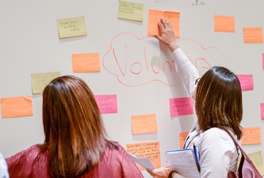
Thirty years ago, a small group of corporate citizenship professionals gathered on campus at Boston College to found the Center for Corporate Citizenship. I am sure that they never imagined that the
Center’s members would grow in number and diversity to the group that we have today, but what was certain was that the combination of knowledge, tools, and a room full of smart people would bring innovation and deliver business and social value through environmental, social, and governance initiatives.
Those same principles were at work in April at the Center’s annual International Corporate Citizenship Conference, where a community of more than 600 smart people shared knowledge and tools about corporate citizenship. As part of the event’s 26 breakout sessions, I facilitated a workshop designed to share ideas and tools to make you smarter, your networks stronger, and your programs better. Who wouldn’t want to do that?
The workshop had four guiding principles:
- You are not the smartest person in the room
- Great ideas are everywhere
- Bring all ideas to the table
- Make everything visible
These principles are not unique, they are the underpinnings of Design Thinking—championed by IDEO—and Appreciative Inquiry, taught widely here at the Carroll School of Management. The approach encourages innovation and creativity and is particularly relevant to the field of corporate citizenship.
The Design Thinking process breaks the practice of creating into discovery, design, pilot, implement, and debrief phases. The process encourages questions, data collection, community involvement, and continual iteration and improvement. Many practical tools for Design Thinking are available and I have found them most helpful when attempting to get a better understanding of the needs of stakeholders.
One tool used in the workshop that may be of value to you is a Knowledge Wall. All that it requires is structured facilitation focusing the group on your design challenge, a wall, Post-It notes and your group’s collective knowledge. As you move through your strategic planning, training, or program review meeting, the Knowledge Wall becomes a canvas for creating and revising programs and a visual record of insights, half-baked ideas, and questions.
Melissa Smith, program manager of community affairs at Denso Corporation, and alumni of the Boston College Center for Corporate Citizenship’s Leadership Academy, is using the Knowledge Wall as, “…a key and critical part of [her] daily activities. It provides inspiration and reminders, while also serving as a conversation starter with colleagues. It helps [her] not only gather thoughts, but creates an environment for new ways of thinking."
Thirty years ago, there was no official Knowledge Wall, but there was a black board, a desire to further professionalize the corporate citizenship space, and a room full of innovative, intelligent, and engaged business leaders. Their legacy is a growing community of corporate citizenship professionals and a rich offering of programs that support professionals in the field—including 18 corporate citizenship classes starting in September. If you are looking to know more, do more, and achieve more, then I’d encourage you to take a look at our new calendar and I look forward to seeing you posting an insight on the Knowledge Wall at your next corporate citizenship class.